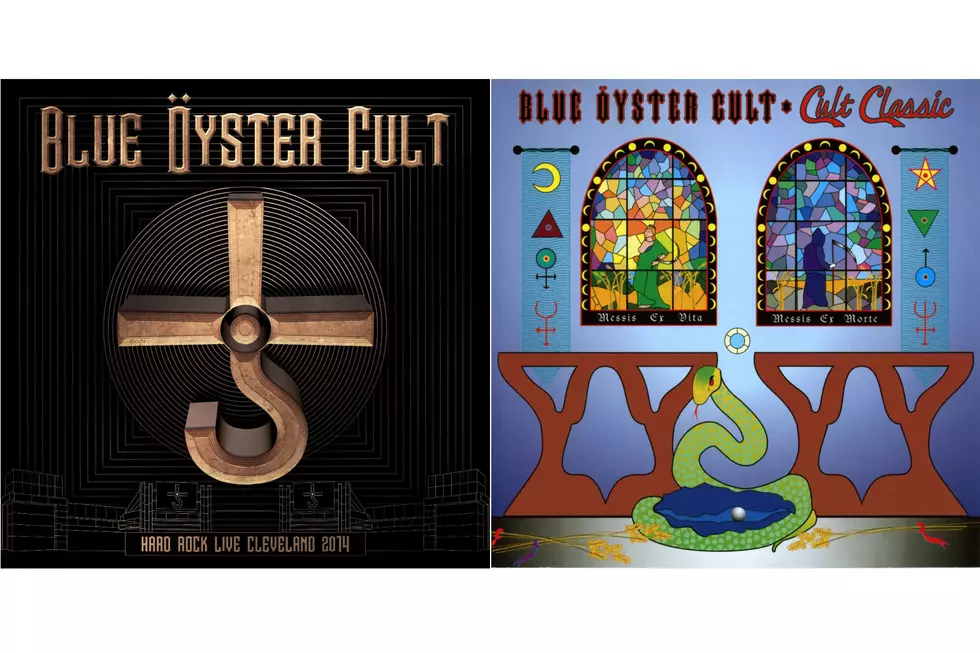
How Blue Oyster Cult Finally Broke Out With ‘Agents of Fortune’
Early on, Blue Oyster Cult were thought of as the "thinking man's hard rock band." And if that designation initially hurt their career, they made up for it big time when they released their fourth album, Agents of Fortune, on May 21, 1976.
It had been a tough road to stardom. They were formed in the late '60s as Soft White Underbelly by guitarist Donald "Buck Dharma" Roeser, drummer Albert Bouchard and late keyboardist Allen Lanier. Along the way, they picked up singer/guitarist Eric Bloom and bassist Joe Bouchard (Albert's brother) and signed to Columbia Records.
From 1972 through 1974, they released three classic studio albums – Blue Oyster Cult, Tyranny and Mutation and Secret Treaties – and continued to tour and build a following. The release of the double-live On Your Feet or on Your Knees in 1975 pushed open the door to commercial success, and it was knocked down with Agents of Fortune.
The record was, in some ways, the distillation of what the band had been up to at that point, but with a slightly more commercial coating, which helped earn the band their first platinum-selling album. It kicks off with the dynamic "This Ain't the Summer of Love," which blasts out of the gate full throttle. But the next track, "True Confessions," is decidedly poppier than fans were used to. "Morning Final," "Tenderloin," and "Debbie Denise" all employed a more polished gloss, with noted session horn players Randy and Michael Brecker brought in to add to the sound.
Despite the polish, the old group were not put to rest though, as the album's first single, "(Don't Fear) The Reaper" showed. Written by Dharma, it connected with radio and the public big time. The single just missed the U.S. Top 10 in the summer of '76, and the album sold, in large part, based on that one song.
Listen to Blue Oyster Cult's '(Don't Fear) The Reaper'
From the Byrds-inspired main riff to the mid-song eruption, it was unlike anything else on radio at the time, even if its singer didn't think so. “Actually, I’ll be honest, some of us thought it was a little too commercial sounding at first," Bloom told Music Radar. "Shows you what idiots we were! When people call us a metal band, I say, ‘Au contraire, have you heard '(Don’t Fear) The Reaper?'' That’s not metal at all.”
Over time, of course, "(Don't Fear) The Reaper" has not only become a genuine rock classic, but gained another lease on life via the infamous "more cowbell" skit on Saturday Night Live. "Man, I feel a little bad for Christopher Walken, who is stuck with people coming up to him and saying, ‘More cowbell!’" Bloom added. "More people probably know 'Reaper' from that SNL sketch than those who knew the song to start with, which is incredible since it was a big hit." "This Ain't the Summer of Love" was released as the follow-up single to "(Don't Fear) The Reaper," but failed to even make the Top 100.
Another of the album's finest moments was "The Revenge of Vera Gemini," a haunting song that was written by drummer Albert Bouchard and singer Patti Smith, who was, at one time, in a relationship with Lanier. Smith sings background vocals and does a spoken word intro on the song.
"E.T.I. (Extra Terrestrial Intelligence)" and "Tattoo Vampire" both kick out the jams, as they straddle the line between the harder edge of the early albums and the new, slicker sound. For the most part, this would become the template the band would stick with for a few years, mining a more polished, yet rocking style. The album was produced by Sandy Pearlman and Murray Krugman, who had also handled the boards for all the band's prior recordings.
Though their next release Spectres was a hit, it didn't match up to Agents of Fortune in sales or radio play. Blue Oyster Cuylt continued to be a strong concert attraction, but were unable to strike big pay dirt again until the 1981 smash "Burnin' for You" and the album Fire of Unknown Origin. Though Agents of Fortune is a solid album, and an obvious cornerstone of the band's story, it was a bit of a letdown after those first three brilliant and unique albums.
Blue Oyster Cult Albums Ranked
More From Ultimate Classic Rock









